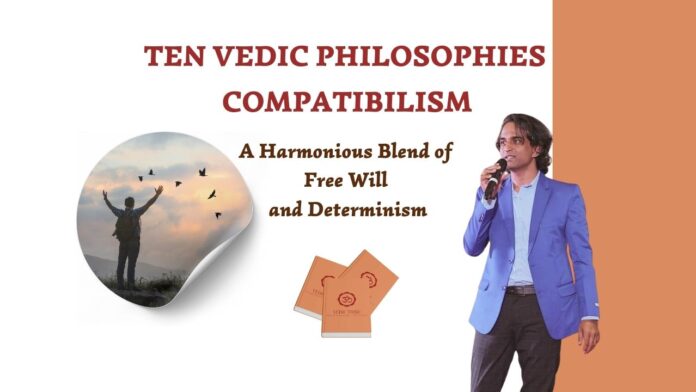Do we have free will OR everything is pre-destined?
In the previous article, we discussed “asceticism” and in this article we will discuss the philosophical idea “compatibilism”.
In Philosophy, there is an age-old question – whether our actions are truly our own or predetermined by factors beyond our control? Compatibilism is a philosophical view that reconciles the apparent tension between free will and determinism.
In this article we will discuss this idea from Vedic tradition’s perspective.
The tension and compatible view:
The idea of free will: It suggests that individuals have the capacity to make choices that are not determined by past events. It implies that we are the ultimate cause of our actions and are responsible for the consequences. For example, if a man kills someone with a knife, the murderer is considered to have acted with free will; i.e., he had a choice not to kill but he chose to kill.
The idea of Determinism: It suggests that all events, including human actions, are caused by prior events in accordance with the laws of nature. This suggests that our choices are not truly free, as they are ultimately determined by factors beyond our control, such as genetics, environment, and past experiences. For example, if a doctor’s surgery is successful it is considered pre-determined.
Compatibilism: Itis a philosophical view that reconciles the apparent tension between free will and determinism. It suggests that both concepts can coexist, without one negating the other. It suggests that we can still be free even if our actions are determined, as long as our choices are not constrained by external forces. According to compatibilism, the universe with all its galaxies, stars, and planets, operates according to cause and effect, yet still allows for a degree of freedom and spontaneity specially in case of complex systems like human brain. I.e., at a macro level, everything is predetermined but it contains degrees of freedom for complex beings like humans. For example, the trajectory of planet earth, motion of sun & galaxies are predetermined. But a murderer on planet earth had a choice not to kill. Because the murderer is a complex system / being, there is a small degree of freedom.
The Vedic Perspective on Free Will and Determinism
Vedic philosophy, offers a profound perspective on this age-old philosophical dilemma. It introduces two key concepts:
Karma: The law of cause and effect, which suggests that our actions shape our future experiences. This implies a degree of free will, as we have the choice to act in different ways.
Niyati: The cosmic law or divine plan, which governs the ultimate course of events. This suggests a degree of determinism, as our destinies are ultimately determined by higher forces.
Free Will and Divine Will: A Vedantic Perspective
At first glance, these two concepts (Karma & Niyati) might seem contradictory. However, the Vedanta offers a harmonious synthesis with a unique perspective on the interplay between free will and divine will.
The Role of Mind: Vedanta emphasizes that the consequences of our actions are not solely determined by the actions themselves, but rather by our mental state while performing them. Our intentions, motivations, and emotions significantly influence our future experience. This implies that we have the freedom to choose our mindset, even as we participate in the cosmic drama. In the earlier example, both the doctor and the murderer chose to use a knife and cut / stab someone. That very event is Niyati i.e., pre-determined; but their mental state is different. Doctor’s intent is to save a person’s life and murderer’s intention is to end a life. Depending on their mental state, the results of their action will be experienced by them in future. This law of karma holds good even though their actions were part of larger cosmic play.
The Divine Plan and Individual Choice: Bhagavad Gita provides a powerful example of this concept. Lord Krishna, the divine, instructs Arjuna to fulfil his duty as a warrior, which is part of the cosmic plan. However, Krishna simultaneously guides Arjuna to transcend his ego and connect with his true spiritual nature. This suggests that while our actions may be predetermined, our inner state of being remains within our control. It was “Niyati” for Arjuna to fight in the war but his “Karma” within the Niyati became “sat-karma” due to his mental state elevated by the preaching of Lord Krishna.
Balancing Free Will and Divine Will: In essence, Vedic philosophy reconciles free will and determinism by suggesting that our actions are instrumental in fulfilling the divine plan. By performing our duties with a detached and selfless attitude, we align ourselves with the cosmic order and experience the fruits of our actions in a harmonious way.
The Practical Implications of Vedic Compatibilism
Mental balance: Let every action be guided by the highest good for all, embodying the Upanishadic ideal of “Sarve Bhavantu Sukhinah” (may all be happy), and prioritize righteous action (“Sat-Karma”) over fretting about uncontrollable destiny (“Niyati”). Cultivate a mental state of universal well-being ensuring every action aims for the collective good.
Embracing Responsibility: Embracing free will means accepting accountability for our actions and their outcomes, fostering mental fortitude and a heightened awareness of consequences, which, in turn, strengthens our sense of responsibility to all.
Surrendering to the Divine Will: By surrendering to the higher power (Niyati), we can release our attachment to outcomes and find peace in the present moment. This is the key tospiritual growth.
In the next article, we will discuss the philosophical idea “Hedonism”.
Madhwesh K
Vedic Tribe

